Opinion

“NO KNEELING!” So tweets our “dominate-the-streets” president in response to white football star Drew Brees voicing support for fellow players who take a knee during the national anthem to protest police violence. This, while demonstrations swell across the country in response to the murder of George Floyd by an officer who drilled his knee into Floyd’s neck for almost 9 minutes while the man lay face down on the ground, defenseless and dying.

When I see footage of Black murders, I feel horror and anger not only at the life that was violently taken, but also the idea of vacant and immune gazes transfixed on an unrealized destiny, a muted future, someone’s son, daughter, or father. There are some who, despite the graphic nature of these images, will watch with no sadness and no outrage. They will not see a person, only an object — objectified in life and objectified in death.
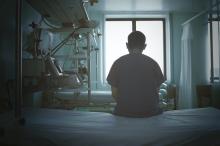
During this time of COVID-19, people are dying alone, away from their families and from priests or pastors who might ease their passing. You could no more shoehorn a dozen people into a hospital room than you should cram them unmasked into any enclosed space these days. A pastor or chaplain might be forced to visit the room remotely, to FaceTime last rites, so to speak.
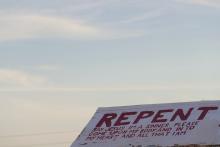
Prior to this moment, new allies have preached a gospel of Jesus devoid of justice. They failed to make the theological connection that Jesus and justice are, in fact, mutually inclusive. To invoke Jesus and then to invoke justice is redundant. Every time we invoke the name of Jesus, we commit ourselves to the ministry of justice. Every time we invoke the name of Jesus, we declare the psalmist’s decree that justice and righteousness are the foundations of God’s throne. Every time we invoke the name of Jesus, we summon the messianic prophecy that the spirit of the lord was upon Jesus, to preach the good news to the poor, to set the prisoners free from the Roman industrial complex, and to proclaim liberty to those who were oppressed. Every time we invoke the name of Jesus, we remember that Jesus was convicted of a crime he did not commit, received an unfair trial, and was sentenced to a state-sanctioned lynching on a tree. The ministry of justice is the ministry of Jesus. We cannot divorce our theology from the ministry of justice. To do so is to divorce ourselves from Jesus himself.

White churches need to enter conversations of racial justice with sobriety.

Black people don’t always end up dead when encountering police. But we almost always end up wounded.
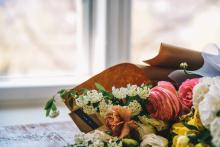
Rituals surrounding death provide solace and comfort. Ceremonies, such as funerals, hold our challenging and complicated emotions and provide space for us to acknowledge and accept the reality of death. But when we are not able to be physically held by those outside of our own home or partake in our religious rituals and death traditions, how do we process the death of those we love? Even as states reopen and larger groups are permitted to gather, some people are still apprehensive about convening. In this unfamiliar and uncertain moment, how do we mourn?
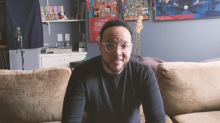
Black people have the most grace
You know why we insist that we strong
Cause for 400 years we have carried this weight
We got out okay
We are not okay
You are not okay
This is not okay
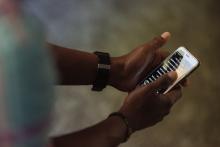
To my acquaintance, and white people who need to hear it, I say this lovingly and from a place of abundance, without scarcity: I know you are hurting too. You are human. But this is not about your pain.
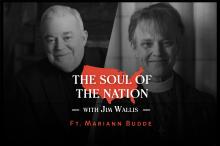
Mariann Edgar Budde, bishop of the Episcopal Diocese of Washington, speaks with Rev. Jim Wallis about our need to focus our outrage on the tragic death of George Floyd and the systemic structures that caused it. She warns against being distracted by Donald Trump's brazen attempt to falsely cloak himself with spiritual authority by staging a photo op in front of St. John's, Lafayette Square.
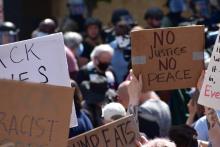
Eddie Glaude has rightly named the violent White House walk to St. John’s as “dictatorial theatre.” The words that came to mind for many of us were sacrilege and blasphemy. Here's the dictionary's definition of blasphemy: "Impious utterance or action concerning God or sacred things." Another word that came to mind was authoritarian. At the epicenter of political power in the United States stands a little church that Donald Trump has decided to violently use — and now St. John’s stands inside a police perimeter surrounding that seat of power.
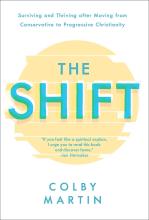
The Shift is Colby Martin's attempt to provide a survival guide for those who’ve left (or been kicked out of) their conservative Christian communities and are now moving toward a more open and expansive faith.
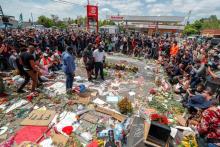
In Exodus, the Egyptians shed innocent blood. Then God made this blood visible for all to see.

When the spirit came down and lit a fire in the remnant of Jesus followers on Pentecost, those followers immediately went out to the streets and protested.

Looting is not the story. Murder is the story.
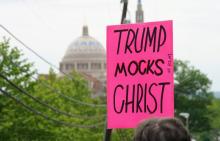
Editor’s Note : Amid nationwide protests following the police killing of George Floyd in Minneapolis, Minn., President Donald Trump on June 1 threatened in a Rose Garden speech that he would deploy military personnel to cities that refused to call out the National Guard. Following his announcement, police dispersed a peaceful protest outside the White House with tear gas and rubber bullets so the president could cross the park and pose in front of the historic St. John’s Church. Rev. Gini Gerbasi, rector at St. John’s Episcopal Church, Georgetown, about two miles west, had been at St. John’s Lafayette Square organizing aid for protesters that afternoon. This is her account of the events.
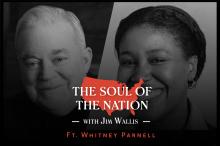
Whitney Parnell, Founder and CEO of Service Never Sleeps, talks with Rev. Jim Wallis in the aftermath of the murder of George Floyd about systemic racism, white privilege, and the hope for our collective future.

COVID-19 is culling the herd of humanity. Beneath the conversation about herd immunity lies a silent and unstated conversation about who will survive. Why are black and brown communities being hit so hard? Why are we more likely than whites to die if admitted to the hospital? Who gets access to health care of any kind, and with regard to COVID-19, to inequitably distributed tests? Who gets a ventilator and who does not?
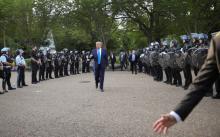
Last night, Donald Trump used and abused a church, and a Bible, as presidential props for a photo-op. In a violent and authoritarian act, the president of the United States took the space of a church and used a picture of a Bible to make a political move.
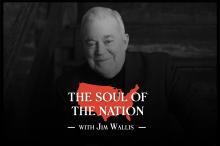
As we pass the horrifying milestone of 100,000 American deaths to the coronavirus, we’re using the hashtag #Lament100k to urge people to pause — to lament.